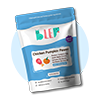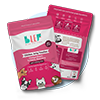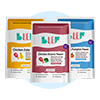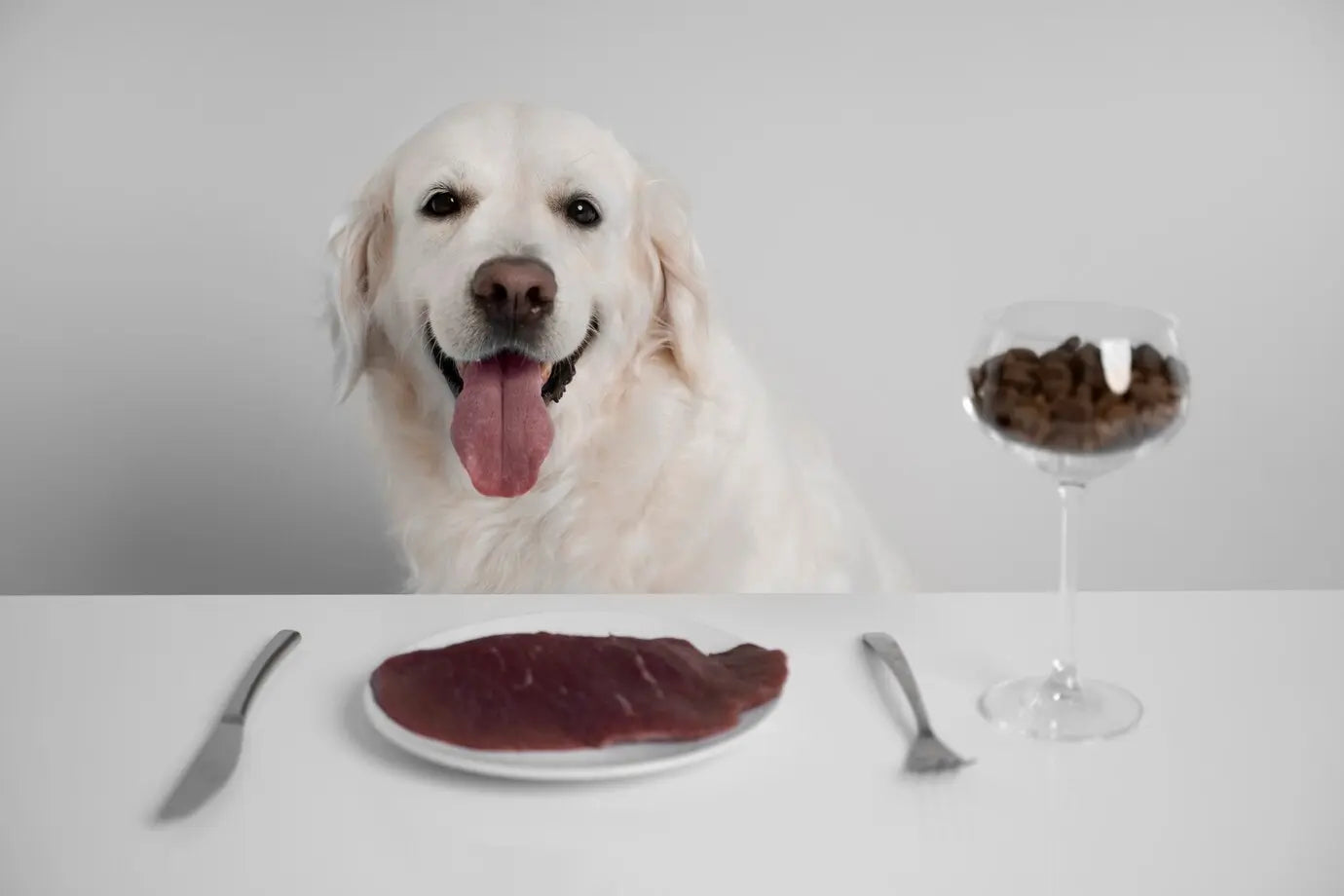One day your dog skips a meal. The next, they’re sluggish, their coat looks dull, and they’re just… off. Your furry friend can’t tell you when something’s wrong, but their gut is already giving you signs. This scenario becomes even more common during summers. Heat waves can cause many dogs to lose their appetite or become more lethargic, which often masks underlying digestive issues.
We all want our dogs, whether a curious puppy, active adult, or wise senior, to live happy, energetic, and healthy lives. So, we feed them what we believe is a balanced diet, make sure they get their daily walk, and schedule regular checkups with the vet. But there is one important aspect of their well-being that most pet parents often ignore: gut health.
Gut health doesn’t just affect digestion in your dog but also impacts their immunity and mood. In fact, the age-related issues in your dog, from joint inflammation to cognitive decline, can be influenced by their gut health. In this article, we’ll explore why keeping your dog’s gut in check can make a world of difference to their health and happiness.
Why Gut Health Is So Important for Dogs?

Most people think of the gut as just a place where food gets broken down. But it’s actually a complex, intelligent system, often called the “second brain.” It communicates with the brain and body through a network of nerves and chemicals.
Inside your dog’s belly lives a complex ecosystem of trillions of bacteria, collectively known as the gut microbiome. When balanced, this tiny universe supports nutrient absorption, keeps harmful pathogens at bay, and even helps produce essential vitamins like B12 and K. The microbes also regulate the immune responses and support the production of anti-inflammatory compounds.
Here’s what a healthy gut looks like across all life stages:
-
Puppies: Better growth and fewer tummy troubles.
-
Adult dogs: Stable energy, strong immunity, smooth digestion,
-
Senior dogs: Reduced inflammation, improved cognitive function.
What Happens When the Gut is Off-Balance?

When your dog’s gut is unbalanced, you’ll likely notice it, especially during summer, when appetite changes or sluggish behavior might seem “normal.”
Watch out for:
-
Excessive gas or bloating
-
Irregular stools (diarrhea or constipation)
-
Skin problems like itching and inflammation
-
Lethargy or behavioral changes
-
Loss of appetite
-
Vomiting or weight fluctuations
These are signs that your dog’s body isn’t absorbing nutrients properly or fighting off illness as well as it should. Some breeds, like Labradors, Beagles, Shih Tzus, and Golden Retrievers, are especially prone to gut sensitivities. That makes early care even more crucial.
What Affects Your Dog’s Gut Health?
There are several factors that can influence the health of your dog’s gut microbiome. Being aware of these can help you make informed choices:
1. Diet

What your dog eats is the foundation of their gut health. Highly processed food or oily table scraps might seem harmless, but they can mess with your dog’s digestion and feed the bad bacteria in their gut.
What to do: Choose a fiber-rich, nutrient-packed diet that suits your dog’s age and breed. Try building meals around whole, fiber-rich ingredients like pumpkin, sweet potatoes, or grains (if they tolerate grains). These support digestion and help keep things moving
You can also include:
-
Probiotics: Found in safe fermented foods (vet-approved) or supplements, they add healthy bacteria.
-
Prebiotics: Found in veggies like carrots and asparagus, they feed good bacteria.
Don’t forget broth!
Adding broth to your dog’s meals not only boosts flavor and palatability (especially helpful during summer appetite slumps) but also supports hydration and gut healing. A good broth is rich in collagen, amino acids, and essential minerals that are gentle on the tummy.
We recommend this chicken broth for cats and dogs by BLEP as it's easy to digest, vet-approved, and packed with nutrients your pet’s gut will thank you for.
For puppies and seniors especially, probiotics and gut-supportive additions like broth can make a visible difference in digestion and energy levels.
2. Hydration

Water keeps digestion running smoothly. But dogs are less likely to drink enough water during hot months, which can lead to constipation or fatigue.
What to do: Always ensure your dog has access to clean, fresh water, and consider adding moisture-rich foods to their diet during summer.
3. Physical Activity

Just like humans, dogs aren't meant to sit around all day. Daily walks, play sessions, or even indoor games help improve gut motility. This is essential not just for adult dogs but also to keep puppies stimulated and older dogs mobile.
What to do: To keep your dog safe from the heat, avoid walking them during peak daytime temperatures. Instead, schedule walks in the early morning or late evening when it’s cooler. Afterward, apply a soothing balm to protect their paws.
4. Stress

Dogs are sensitive animals. Sudden changes, loud environments, or separation anxiety can lead to stress, which in turn can disrupt the gut microbiota. Cortisol, the stress hormone, affects digestion and alters the gut environment.
What to do: Keep things calm and predictable. Dogs thrive on routine, so even something as simple as feeding and walking them at the same time daily can go a long way in keeping your dog’s gut balanced.
How to Recognize If Your Dog is Having Gut Issues?
Changes in a dog’s behavior are often the first sign that something isn’t right. As a pet parent, you might notice shifts in their routine. These subtle changes can point to underlying issues, particularly related to gut health.
1. Unusual Digestive Behavior
If your dog is frequently vomiting, experiencing diarrhoea, or struggling with constipation, it could point to a disruption in their gut microbiota.
2. Loss of Interest in Food
In summer, appetite dips can happen, but if it continues or worsens, the gut might be inflamed or irritated.
3. Fluctuating Weight
Even if your dog is eating a decent amount, they might not be getting the nutrition they need. When the gut is not functioning properly, it can’t process or absorb nutrients efficiently.
4. Skin & Coat Concerns
Your dog’s skin and coat health are directly influenced by their gut. Dull fur, flaky skin, or sudden itchiness could all be signs that something’s wrong inside. If your dog is constantly scratching or shedding more than usual, their gut health might be affected.
The Right Time to Consult a Vet
Occasional digestive issues happen. But if your dog shows consistent signs of discomfort or health changes, it can sometimes signal deeper problems. Whether it’s a puppy with chronic diarrhea or an elderly dog losing weight, your vet can check for infections, food sensitivities, or microbiota imbalances and guide you toward the right treatment plan or dietary changes. Early intervention can save your dog a lot of discomfort and help you get back to a happy, tail-wagging routine.
Healthy Gut, Happy Dog
You love your dog like family. So why not care for their health like you would your own? A strong, balanced gut is the foundation of their overall well-being, impacting everything from how they digest food to how they feel and behave. That’s why taking care of their gut is a must.

At BLEP, we believe good health starts from the inside out. Our pet meals are made with human-grade ingredients, packed with essential nutrients, and absolutely free from preservatives and artificial flavors. Every bowl is crafted to support your dog’s digestion and overall well-being.
So if you’re looking for a simple way to give your dog the care they deserve, start with what’s in their bowl. Because when their tummy’s right, you’ll see the difference in every wag of their tail.
Looking to explore more healthy treats and care tips for your furry friend? Check out our other guides like Can Dogs Eat Apples?, Can Dogs Eat Blueberries?, Why Do Dogs Licks You?, Can Dogs Eat Strawberries?, Can dogs Eat Mango?, Dog Food for Weight Loss, Raw v/s cooked meat for dogs, Home Remedies to cure tick fever, Common Skin Problems in Dogs, Finding Good Dog Food in India, How many times should I feed my dog?, Things you should do to keep your pet healthy, Types of Dog Food, and How Prebiotics and Probiotics can improve your dog's digestion. Each guide is designed to help you make better food choices for your dog because a happy dog starts with the right diet.












